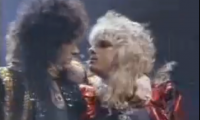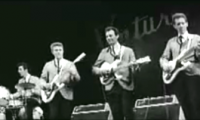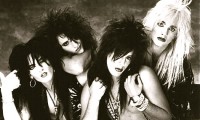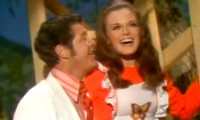Mariah Carey, “All I Want For Christmas Is You” (1994)
Whenever December rolls around, the religious songs written to celebrate the transcendent occasion of the birth of Jesus Christ, like “Silent Night” or “Gloria In Excelsis Deo,” become part of the background noise in every single shopping plaza, strip mall and boutique across North America. They take their place in an endless looping rotation alongside secular Christmas tunes like “Jingle Bells,” “Deck the Halls,” “All I Want For Christmas Is You,” or the supremely odious “Twelve Days of Christmas.” The purpose of blaring so much Christmas-themed music into the halls of our consumerist temples is, of course, to help us ‘get into the spirit.’
I can tell you that this chattering soundtrack to the yearly retail feeding frenzy does not get me into the spirit. However, there are some gems in the vast and ever-expanding archive of Christmas songs that can get Mariah Carey out of my head, at least temporarily. Like this one, for example, which has always been my favourite Christmas song.
The Kinks, “Father Christmas” (1977)
In the pre-Internet world, this was one of the few songs I would look forward to hearing every year come December. It is also one of the most wondrously erratic moments in the wondrously erratic career of ever-garrulous Kinks frontman, Ray Davies.
A prime characteristic of Christmas albums is that they are easy. Any pop act can slip into the studio, lazily record a group of pre-existing (and often copyright-free) songs, release the result sometime around Black Friday and generally count on moving thousands upon thousands of units. Not for Davies, and isn’t it like him to inject a catchy serum of British class consciousness into the syrupy mush of seasonal music? I don’t know of anyone else who has toured the misery of the holidays so well outside of John Prine in his comically dour “The Insane Clown Posse.”
I suspect that “Father Christmas” was written as a response to John Lennon’s “I Believe in Father Christmas.” Where John and Yoko’s idealistic (and effective) choral ditty is a call to an egalitarian utopia, Davies’ tonic tells us it will never happen. War may be over if we want it: we don’t. As Davies reminds us, the best we can do is help each other out once in a while.
Twisted Sister, “We’re Not Gonna Take It” (1984)
Twisted Sister were always a bit of a joke. I am of the opinion that a rock fan should be wary of any band with a cutesy rhyming name: see also Quiet Riot. That said I will freely admit that my thirteen-year-old self merrily bopped along to “We’re Not Gonna Take It” as much as they next guy. A one-hit wonder — two if you are generous — with a goofy cartoon image, Twisted Sister in 1984 were a gateway drug that lead to Iron Maiden and Motorhead. And like any crack addict, I quickly realized that a couple of beers and some glue-sniffing just weren’t going to cut it any longer.
I remind you of Twisted Sister because in 2006, the band attempted to revive their fortunes by releasing a Christmas album (see formula for success above), titled, of course, Twisted Christmas. The most curious and satisfying track on the record is their enthusiastic version of “O Come All Ye Faithful.”
Twisted Sister, “O Come All Ye Faithful” (“A Twisted Christmas,” 2006)
If effect, Twisted Sister create a mash-up of themselves. And if there are any doubts about the band’s intentions, they should be erased around the 3:40 mark when Eddie “Fingers” Ojeda interrupts his solo to play the refrain from “We’re Not Gonna Take It.”
The video finds the band in familiar territory: Harassing middle class ‘squares’ with their music and their presence. The scolding the woman delivers in the intro is a direct echo of Mark Metcalf‘s bellowing father in the original, leading to the conclusion that both diatribes are directed at the same hapless person. The boy of “We’re Not Gonna Take It” may have ‘wanted to rock’ when asked about his future plans but somewhere along the way, it all went terribly wrong. Early middle age finds him a neutered sad sack who mutely absorbs the haranguing of his more attractive girlfriend. Naturally(?), her ball-busting tirade unleashes Twisted Sister, twenty years later and heavier (not in the musical sense) and havoc ensues.
Twisted Sister are far too gentlemanly to go beating a woman all around her house, so her submission predictably comes in the form of erotic surrender. That the gift of a Twisted Sister CD could help a doughy loser unleash the erotic passion of his prim, discontented girlfriend on Christmas is rather unlikely but it’s a charitable thought, I suppose.
At first blush, Christmas music and heavy metal represent opposing musical forces: the former is sentimental, frothy and celebratory, the latter is gloomy, angry and deathly stern. Metal rarely celebrates. But metal and Christmas songs, especially the hymnals, do share certain characteristics.
Halford Supergroup, “We Three Kings” (2010)
There’s a reason why heavy metal singers like Judas Priest’s Rob Halford do better with the religious Christmas songs rather than the secular ones. While Twisted Sister embraced the holiday season with tongue planted firmly in cheek, Halford is serious. When he tells you to ‘get into the spirit,’ it’s more like a threat than an invitation. Raise your spirit high. Or else.
HalfordMusic, “Get Into The Spirit” (“Halford III: Winter Songs,” 2010)
Halford has realized that metal is a perfect platform for the religiosity of the song. For all its anti-Christian posturing, metal has always sought to imitate the epic grandeur that the church, particularly the Catholic church, has always offered its followers; it ascends to the glory, power and majesty that the church commands. It’s no accident that the band who invented heavy metal were called Black Sabbath.
Think of the all the earnest ostentation of a metal concert: the overt hero worship, the hand signals, the chant-a-longs. It’s designed to emulate the transcendence of a religious experience. Many metal acts over the years, like Ozzy Osbourne and Ronnie James Dio, have toured with stage sets that resemble cathedrals. Slayer once toured with a setup that looked like a cross between the apse of St Peter’s and the stage at a Nuremberg rally.
When Twisted Sister performs “O Come All Ye Faithful” live in front of an audience, they really are calling the faithful, albeit a different kind of faithful. And the girlfriend’s submission in the Twisted Sister video isn’t as much a surrender as a conversion.
So I think Rob Halford’s ‘hallelujahs’ are genuine, even if what he is praising is unclear. This is ‘muscular Christianity,’ beefed up with power chords and massive amplification. In their differing ways, the same devotional fervor is what Twisted Sister, Halford, Type O Negative, King Diamond, the brilliantly overblown Trans-Siberian Orchestra, or some of the other suggestions you can find here, hope to achieve.
Believe me, metal does not provide the most incongruous experience of Christmas music possible. I am writing this in Barbados, where I’ve taken to escaping December’s shopping frenzy and I can assure you that it is both totally bizarre and infinitely pleasurable to spend Christmas morning on sun-drenched Dover Beach as Santa Claus (in shorts) floats ashore on a catamaran, pours out rum punch while a reggae version of “Let It Snow” rings out from a beach hut in the background. Really, you should max out your credit card and try it some time.
RastaClaus85, “Christmas Chill: Let It Snow” (2007)
– Christopher Doda






